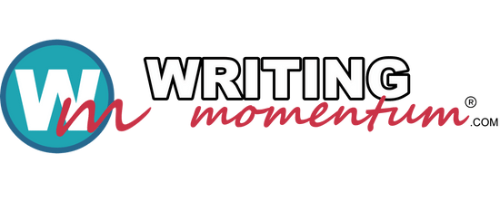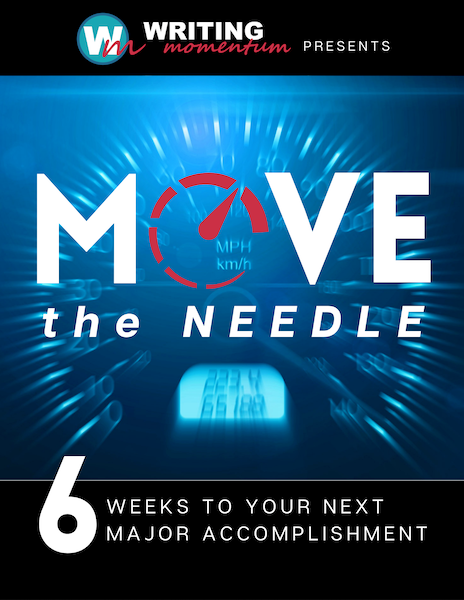Episode 141
The Importance of the First Line
In this episode of the Writing Momentum podcast, hosts Christopher Maselli and Gena Maselli, along with guest Rene Gutteridge, delve into the significance of the first sentence in a book. They discuss how the opening line serves as a handshake with the reader, setting the tone and establishing trust. The episode includes examples of famous first lines and offers practical advice for making your book's opening memorable, whether you're writing fiction or non-fiction. The podcast also highlights the benefits of joining a writing community for continuous improvement and support.
- 00:00 Introduction and Welcome
- 00:56 The Importance of the First Sentence
- 04:33 Analyzing Famous First Lines
- 08:29 Crafting Your Own Compelling First Line
- 14:31 Non-Fiction First Lines Matter Too
- 17:05 Join the Writing Momentum Community
LINKS:
- Liz Wilcox's Email Marketing Membership at http://wmdeal.com/liz
- Get your FREE Move the Needle goal-setting for authors ebook at https://www.writingmomentum.com
- Write with us! Join our writing membership and get your book DONE! https://wmdeal.com/wmmrene
Transcript
How important is the first line of a book?
Christopher:We can help with that.
Christopher:Hello, welcome to the Writing Momentum podcast.
Christopher:I'm Christopher Maselli, here with my wife, Gena.
Gena:Hi there.
Christopher:And who else is with us, Gena?
Gena:The fabulous Rene Gutteridge.
Christopher:Hey, Rene Gutteridge.
Gena:Yay!
Christopher:Wow.
Christopher:Because Rene's here, I know we're going to be talking about something
Christopher:really like meaty and in depth.
Gena:I know.
Gena:She always brings a great depth and wisdom.
Christopher:Yes.
Gena:And she'll probably laugh when I say that because she'll
Gena:be like, no, but she does.
Gena:She brings a lot of wisdom and depth and experience whenever we
Gena:talk about the craft of writing.
Gena:Um, and just the whole world of writing.
Christopher:That's right.
Christopher:We're talking about something crafty today, aren't we?
Gena:We are.
Gena:We're talking about, well, we were posed to the question of how important
Gena:is the first sentence of a book?
Gena:What jobs should it do?
Gena:And, and I think the bottom line is How, how important is it and
Gena:how much time should I spend on it?
Christopher:Well, yeah, the, the question was actually how
Christopher:many words should I have in it?
Christopher:What exactly should it say?
Christopher:What all should I introduce?
Christopher:So there you go, Rene, go ahead and answer.
Rene:That light question.
Rene:Well, first of all, guys, I have to tell you something that I found on
Rene:Etsy that totally has to do this.
Rene:Uh, there's a company on Etsy that will take your book cover.
Rene:and mount it on canvas and it's just beautiful how they do it with the design
Rene:and they put the first line of your book at the bottom with your signature.
Christopher:Oh, that's pretty cool.
Christopher:Well.
Gena:That means pressure.
Christopher:That also means you've got to have a good first liner.
Christopher:It's going to look really funny, right?
Rene:Well, exactly.
Rene:So, so, you know, going into the question here, you know, think
Rene:about the cover of your book and the title, and then the first line.
Rene:Is it worthy to be mounted on the, you know, canvas?
Rene:Um, yeah, I, you know, I've never framed any of my book covers,
Rene:uh, and it got to the point I had so many it felt overwhelming,
Rene:but I think I'm gonna do this.
Rene:I think I'm gonna start and just buy a few.
Rene:Um, so, but it does, uh, it does kind of make you think, if it's going
Rene:to be mounted, should it, it should have a little bit of importance.
Christopher:There's something official about putting it on the wall, right?
Rene:It is, it is, and it might be a good, um, a good exercise in your mind
Rene:as you're thinking of that first line.
Rene:Uh, what would it look like?
Rene:you know, under my cover with my signature under it.
Rene:And is it, is it worthy?
Rene:Um, it, it does function in a lot of different ways and capacities.
Rene:It's not always functioning in the same capacity in every book.
Rene:So, um, for instance, if you're writing a comedy, You want to definitely set
Rene:the tone for that, um, and whether it is through saying a funny piece of dialogue,
Rene:a funny piece of inner monologue, or even a strange pop, pop, pop of words that,
Rene:um, or really clever simile, whatever, whatever it is, uh, it needs to, you know,
Rene:set the tone, especially true in comedy.
Rene:Um, and You know, for everything else, it, it works.
Rene:It, I always say it needs to, you know, kill two birds with one stone.
Rene:You make it a workhorse.
Rene:You make it, um, do everything it needs to do for you and you don't finish it
Rene:till It's done what it needs to do.
Rene:I wouldn't exactly stress over it when you start the book.
Rene:Um, you know, put it down, keep going.
Rene:It's probably going to change in your rewrites.
Rene:It's probably going to change as you go.
Rene:you know, give it your best effort.
Christopher:If there's anything that's going to change, it's
Christopher:probably that first sentence, right?
Christopher:Because as you write the book, you're going to have more clarity as you go
Christopher:exactly that tone you want to set.
Christopher:But it does seem like if you're going to be mounting it, it
Christopher:would have to be pretty short.
Gena:Well, I, I have to come up with this disclaimer or this kind
Gena:of funny anecdote as we were talking about this, as we, as this question
Gena:was posed to us, Chris answered the question, then I answered the question.
Gena:And Chris's response was to, um, go to Amazon and look at the,
Gena:look up the most popular books currently or, or well known authors.
Christopher:Like James Patterson or Michael Crichton, look up something.
Christopher:I figured they would have a compelling first line, right?
Gena:And he, he looked up the compelling first lines.
Gena:My, first instinct was to go and do a search for famous first of books,
Gena:which brought me up literary fiction, which was, uh, Charles Dickens.
Christopher:One of the best is supposed to be the tale of two cities.
Christopher:So why don't you read that to everyone Gena, and Rene, you tell us if this is a
Christopher:great first line that We should emulate.
Christopher:Okay, it was the best of times, it was the worst of times.
Christopher:It was the age of wisdom, it was the age of foolishness.
Christopher:It was the epoch of belief, it was the epoch of incredulity.
Christopher:It was the season of light, it was the season of darkness.
Christopher:It was the spring of hope, it was the winter of despair.
Christopher:We had everything before us, we had nothing before us.
Christopher:We were all going direct to heaven.
Christopher:We were all going direct the other way.
Christopher:In short, the period was so far like the present period that some of its
Christopher:noisiest authorities insisted on its being received for good or for evil in this
Christopher:superlative degree of comparison only.
Christopher:So having read that, Rene, would you go on to sentence two,
Christopher:? Rene: I would.
Christopher:It's brilliant, it's brilliant.
Gena:It's brilliant, isn't it?
Rene:It's so unusual, right?
Rene:Like it's, you know, you already know what, what you want to do
Rene:with the first line is, this is your handshake with the reader.
Rene:You're introducing yourself.
Rene:And what a reader wants to know is are you in control of this story?
Rene:Right, like, it's the kind of like, How strong is your handshake?
Rene:Is it a floppy fish handshake?
Rene:You know, have you ever reached out for a handshake and you thought,
Rene:did I just break their bones?
Rene:I'm, I'm a woman and I, you know, I've got to have, I've got from, from
Rene:another woman, I could maybe, but when you just reach out and my handshake is
Rene:stronger than, you know, and it's, it's like, it's a little bit like, okay, I
Rene:guess I'm, I'm going to be, you know, You know, in charge of the situation.
Rene:If, if they match, you know, you're like, okay, great.
Rene:Like, I feel like we're already connected.
Rene:Our, our handshakes are where we need to be.
Rene:Not everybody has a handshake, and I'm kind of going into some silliness,
Rene:but it is kind of a thing for me.
Rene:But anyway, you're, this is your initial handshake with the reader.
Rene:And they're going to feel safe when they read something like that and
Rene:go, Alright, they know where they're going, they know what they're saying,
Rene:and they've invited me on this trip, but they're obviously in control.
Rene:I'm not going to have to do any driving.
Rene:This, you know, and that's what a reader wants.
Rene:you know, when I work with clients, I say, look, they, a reader does not
Rene:want to, does not want to work hard.
Rene:When I get into my bed at the end of the day and I open that book, I do not
Rene:want to be filling in blanks and trying to figure things out and all of that.
Rene:I just, I want to be carried.
Rene:I want to be pampered.
Rene:I want to be babied.
Rene:And when you get that first line and you go, okay, haven't read that
Rene:before, but this is interesting.
Rene:So.
Rene:You know, if you can think of it like a handshake with the reader, um, it will
Rene:compel you to at least go in strong.
Rene:And, uh, if you're Michael Crichton, um, and James Patterson, you don't
Rene:even have to work anymore, you know?
Christopher:People are going to read regardless, right?
Rene:The handshake has already happened.
Rene:You're walking into the room and everybody knows you're there.
Rene:So, you know, but.
Rene:I think, you know, we should all try hard on all of our books.
Gena:I wanted to follow up because that one was super long.
Gena:And I, and I mean, there's so much we could dissect.
Gena:We could spend an entire podcast just talking about that one opening line and
Gena:the different techniques that he uses in it and just the, the tone of it, the
Gena:mood that it gives us, just all of that.
Gena:But I do want to bring up another famous.
Gena:opening line, which is from Moby Dick, which is only three words.
Gena:Call me Ishmael.
Gena:That was the opening line of that.
Gena:And it's a famous, famous one.
Gena:So it's on the other side, but of course it's using the illusion of
Gena:Ishmael to make us realize that this is going to be heavy hitting and, and
Gena:deeper, and there's layers to it, you know, even with those three words.
Gena:So I think there's something with the opening line, like you said, you've got
Gena:to convince the reader that you know where you're going and that they can trust you.
Gena:There is also an element of, I think there's an emotion that comes into it
Gena:too, where there's a little bit of either, um, It evokes a sense of curiosity, or it
Gena:evokes a sense of humor, or it evokes a sense of just question or, or even irony
Gena:in that there's something about it that evokes something in the reader that keeps
Gena:us going and makes us say, Oh, this, this writer knows what they're doing.
Gena:This is going to be a great ride.
Christopher:Don't you think it also depends on the genre that
Christopher:you're, you're writing, right?
Christopher:So if you're, one thing I would encourage you to do, if you're thinking
Christopher:about you're opening a line to your work is to go on Amazon and look
Christopher:up other books in your genre that are similar to what you're writing.
Christopher:And look at some of the best sellers or some of those that you know have
Christopher:been tried and true over time and read those first sentences and kind
Christopher:of see what other authors are doing.
Christopher:And that can be a good just kind of guide is to know, okay, I'm on
Christopher:the right track here with this.
Christopher:Um, because I would think that in opening to a thriller, like a Michael
Christopher:Crichton book would be quite different than like what we just read from
Christopher:some of these classic literary works.
Rene:Yeah, absolutely.
Rene:And if you want one rule to follow, it's be interesting.
Rene:You know, you can't, you can't stuff everything into, you know, one sentence.
Rene:So, but You want to be interesting.
Rene:I mean, readers aren't going to read the first line and,
Rene:you know, put, tuck it away.
Rene:But I'll tell you, editors, when they open your manuscript and hear, you know,
Rene:She woke up and the sun, sunlight drifted through her room and da da da da da.
Rene:Or she, you know, she sipped her coffee.
Rene:It's, it's like, ah, boy.
Rene:You know, they're, they're already, you know, just like, okay, I'm going to
Rene:have to work myself to be entertained.
Rene:And, um, if you can do the entertaining for them, then again, you're, you
Rene:know, call me Ishmael is what, what a strong handshake, you know, the
Rene:character is introducing themselves, you know, and letting you as a reader
Rene:know, This story is my story that I'm taking you along with, right?
Rene:Like, it's It's already grabbed your attention because of how he introduced it.
Rene:He's setting the tone for what's going to happen.
Rene:Um, so, and you can also, you know, I used to go, literally do this back
Rene:long ago when I had a little more time.
Rene:But when I was writing, I would go to Barnes and Noble and, and like
Rene:Chris said, open books and read the first, I'd read usually read
Rene:the first, you know, few sentences.
Rene:And, you know, you're walking along going, Oh, that's brilliant.
Rene:Oh, that's really good.
Rene:I could do better than that.
Rene:You know, it kind of, it kind of ramps you up to go like, I think
Rene:I can, you know, I I'm feeling it.
Rene:I'm getting ideas.
Rene:I'm, I'm going with it.
Rene:But it, you know, if it's interesting, and then the next sentence is
Rene:interesting, and the next sentence is interesting, then they're already hooked.
Rene:And, you know, as we, as we work on our books, that's one thing that I
Rene:really push my writers who come, you know, to my workshops or through my
Rene:coaching, is, Like, you don't get to lay off after the first sentence.
Rene:You don't get to come out of the gate, you know, do that handshake and then
Rene:sit and have coffee with them and be the most boring, you know, coffee guest ever.
Rene:Um, you, you have to be compelling for 90, 000 words.
Rene:all of it, you have to be compelling for.
Rene:Um, and if you do that, you're always going to have a winner of a book.
Christopher:Because it's like that opening line is really just leading
Christopher:you to the next line, which is leading you to the next line, which is leading
Christopher:you to the next paragraph, right?
Christopher:It's kind of like when you end every chapter, you want to have something that
Christopher:propels them to read the next chapter and everything just leads one to another so
Christopher:that it becomes this constant motion with the, the reader and they are compelled to
Christopher:read, hopefully to the end of the book.
Gena:And I would, I would point out that while we're talking a lot about fiction
Gena:here, it's still true with nonfiction.
Gena:You still want strong, um, strong lines, strong sentences, strong
Gena:structure in nonfiction as well.
Gena:It's not like, oh, I hear this sometimes from writers where they
Gena:will say, well, my message is so good.
Gena:That somehow that seems to be an excuse for not having the strongest opening
Gena:line, or the strongest first paragraph, or strongest first chapter, and whether
Gena:it's fiction or nonfiction, it has to be compelling, and I would say even with
Gena:nonfiction, it has to be compelling and I would say there's a lot of non fiction
Gena:books that might have great lessons And I'm talking mainly about the more self
Gena:help, teaching books, spirituality, Christian living, those kind of books,
Gena:that there's a lot of times where people will say well my message is so good that
Gena:somehow the delivery doesn't matter and Or that that's an excuse for why the
Gena:delivery doesn't need to be top notch and I would say it's actually just the
Gena:opposite You because people are going to go into those books already thinking
Gena:that they know what you're going to tell them or that they already know the
Gena:lessons you're trying to teach them.
Gena:And so you have to be, you, you have to be a strong communicator, uh, in
Gena:non fiction as well as in fiction.
Christopher:Yeah.
Christopher:Convince them right away.
Christopher:why they should read the book.
Gena:It's the strong handshake, but this is the difference between,
Gena:you know, somebody catching you at the supermarket and telling you,
Gena:Oh, let me tell you what I learned.
Gena:And you're just thinking about buying everything on your list versus
Gena:going to a conference with like a well known speaker who's saying,
Gena:I'm going to change your life.
Gena:That when people come into your book, um, It, you know, you don't want them
Gena:to feel like you're just somebody that they met at the supermarket,
Gena:that they could have gotten that, you know, information standing in the
Gena:checkout line, reading the headlines.
Gena:You want them to feel like, no, this is really important, and
Gena:this is really special, and this is really something you need.
Gena:So, I just want to make, make that clear that this is not just,
Gena:um, this is not just for fiction.
Gena:This is also for non fiction.
Christopher:100 percent 100 percent Hey, if you've liked this teaching, we did too.
Gena:Yeah, this is a good one.
Christopher:So tell you what, this is, you know, this is something
Christopher:Rene and Gena and I talk about this kind of stuff on a regular basis
Christopher:in our writing momentum membership.
Christopher:And if you're, if you're not a part of a writer's group or you're like, man,
Christopher:I need, I need some of my people to get together with and talk about these
Christopher:kinds of things with on a regular basis.
Christopher:That's why we have the writing momentum membership and you
Christopher:can go to writing momentum.
Christopher:com and find out all about it.
Christopher:It's not expensive.
Christopher:It's only 25 a month.
Christopher:And every single week we get together sometimes multiple times per week.
Christopher:And we talk about things like this and just really work together on our
Christopher:manuscripts and make them stronger.
Christopher:And it makes such a difference to be able to have this kind of
Christopher:thing on your mind all the time.
Gena:Absolutely.
Gena:Because Chris, together,
Christopher:together we have writing momentum.
Christopher:Thanks for joining Rene, it was so good to see you again.
Christopher:And we're going to get together again soon where we're going to talk
Christopher:about more of this writing stuff,
Gena:more of this writing stuff.
Christopher:Bye bye.





